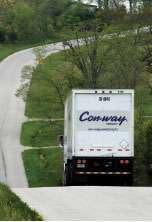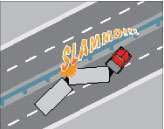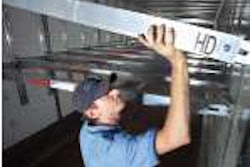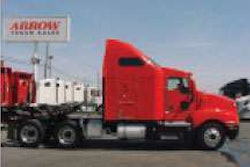Following its participation in a major study of integrated safety technologies, Con-way has put into service nearly 1,300 new Freightliner Cascadia 2010-model tractors equipped with an integrated suite of advanced driver alert and truck control technologies. The company says the replacement tractors represent an overall investment of more than $100 million, with the integrated suite of safety technologies comprising $5.4 million.
 Con-way Freight has put into service nearly 1,300 new Freightliner Cascadia 2010-model tractors equipped with an integrated suite of advanced driver alert and truck control technologies.
Con-way Freight has put into service nearly 1,300 new Freightliner Cascadia 2010-model tractors equipped with an integrated suite of advanced driver alert and truck control technologies.To address front-end collisions, rollovers and lane changes/departures, Con-way Freight has adopted Meritor WABCO’s Forward Collision Warning OnGuard and Roll Stability Control systems, as well as Iteris’ AutoVue Lane Departure Warning system. The suite also includes factory-installed in-dash AM/FM/satellite radio units that replace portable radios and are designed to minimize driver distraction.
Con-way Freight began testing these and other technologies in February 2009 in partnership with the Federal Motor Carrier Safety Administration and the University of Michigan Transportation Research Institute, which managed the U.S. Department of Transportation-funded Integrated Vehicle-Based Safety System program. Over the next 10 months, UMTRI conducted field testing and evaluation of a new integrated crash warning system for commercial trucks. CCJ last year recognized Con-way Freight as a CCJ Innovator for its efforts to test integrated safety systems.
As a participant in the study, Con-way Freight purchased 10 Class 8 tractors equipped with the IVBSS suite of technologies; 18 Con-way Freight truck drivers operated the IVBSS-equipped trucks in regular commercial service out of the company’s Detroit service center. The program collected and analyzed data on system performance as well as driver interaction and feedback in real-world operating conditions.
“With the anticipated release of FMCSA’s Comprehensive Safety Analysis 2010 initiative and the potential for stricter safety regulations for truck drivers and trucking companies, Con-way Freight is proactively pursuing a high-tech approach to safety,” says Bob Petrancosta, vice president of safety for the Ann Arbor, Mich.-based less-than-truckload carrier. “We were very pleased to work with the FMCSA and UMTRI to test and validate these technologies over the past year. It confirmed what we initially believed – these are effective technologies in our operation that can provide real-world lifesaving results.”
In Brief
* The results from the Commercial Vehicle Safety Alliance’s recent Roadcheck 2010 reveal that the commercial motor vehicle industry is hovering close to the record-low out-of-service rates set during 2009. More than 9,856 CVSA-certified inspectors at 2,482 locations across North America performed 65,327 truck and bus inspections.
* The U.S. Department of Transportation allocated $6 million to help address parking shortages for commercial trucks on I-15 in Utah, I-10 in Mississippi, I-5 in Oregon, I-40 in Tennessee and I-81 in Pennsylvania. The funds will be used to add parking capacity and develop ways to provide updated information to drivers on space availability along the corridors.
*The Federal Motor Carrier Safety Administration published two Federal Register notices last month to provide guidance to states regarding the integrity and timeliness of driver history records. For copies of the notices, go to www.regulations.gov and search FR Doc. 2010-16218 and FR Doc. 2010-16226 separately.
* FMCSA issued a notice of claim charging Cayetano Martinez, owner of bus company Tierra Santa Inc., with 78 violations of 13 separate motor carrier safety regulations and $72,760 in fines resulting from the agency’s investigation of a March 5 fatal crash in Phoenix involving a bus operated by the company in which six passengers were killed and 16 others were injured.
* Transporters of anhydrous ammonia would receive a two-year limited exemption from the hours-of-service regulations under a proposal published last month by the Federal Motor Carrier Safety Administration. For more, go to www.regulations.gov and search FMCSA-2010-0230.
Preventable or not:
Rain ruins Doe’s doubles train
It was late afternoon in early August when ominous fast-moving clouds began to unleash a heavy rain upon Interstate 12 as doubles driver John Doe zipped along at the posted speed while chewing some cold, stiff yet residually tasty celery sticks left over from the rations he’d packed the previous day. “Gee whizikers,” Doe mused. “The wind’s starting to howl like a crazed coon dog!” Dutifully cautious during severely inclement weather, he immediately reduced his speed to a relatively lethargic 55 mph.
 Even though John Doe had slowed his doubles train during the windy rainstorm on the interstate, he nonetheless jackknifed. Was this a preventable accident?
Even though John Doe had slowed his doubles train during the windy rainstorm on the interstate, he nonetheless jackknifed. Was this a preventable accident?The rain continued to come down in waves and drum loudly on the roof of Doe’s cab, making it hard to concentrate on the weather alerts coming over the radio. Suddenly, as his rig was buffeted roughly by another gust of wind, Doe sensed that something was wrong …a feeling that was verified by the sickening sight, in his West Coast mirror, of an impending jackknife … SLAMMO!!! SCREEEEECH!!! BLAM!!!
Oh no!!! Doe’s combination had jackknifed big time, smack in the middle of I-12, and had slammed into the guardrail with tremendous force, nearly causing Doe to choke to death on his last mouthful of leftover celery. Without the lubricating quality of his low-calorie energy drink, he might’ve been a goner!
But his throat grew dry again when he received a warning letter for a preventable accident from his safety director, which Doe promptly contested due to Mother Nature, so the National Safety Council’s Accident Review Committee was asked to resolve the dispute. NSC upheld the “preventable” ruling, noting that Doe, despite his speed reduction, still was driving his doubles train too fast for gusty high-wind conditions. n











